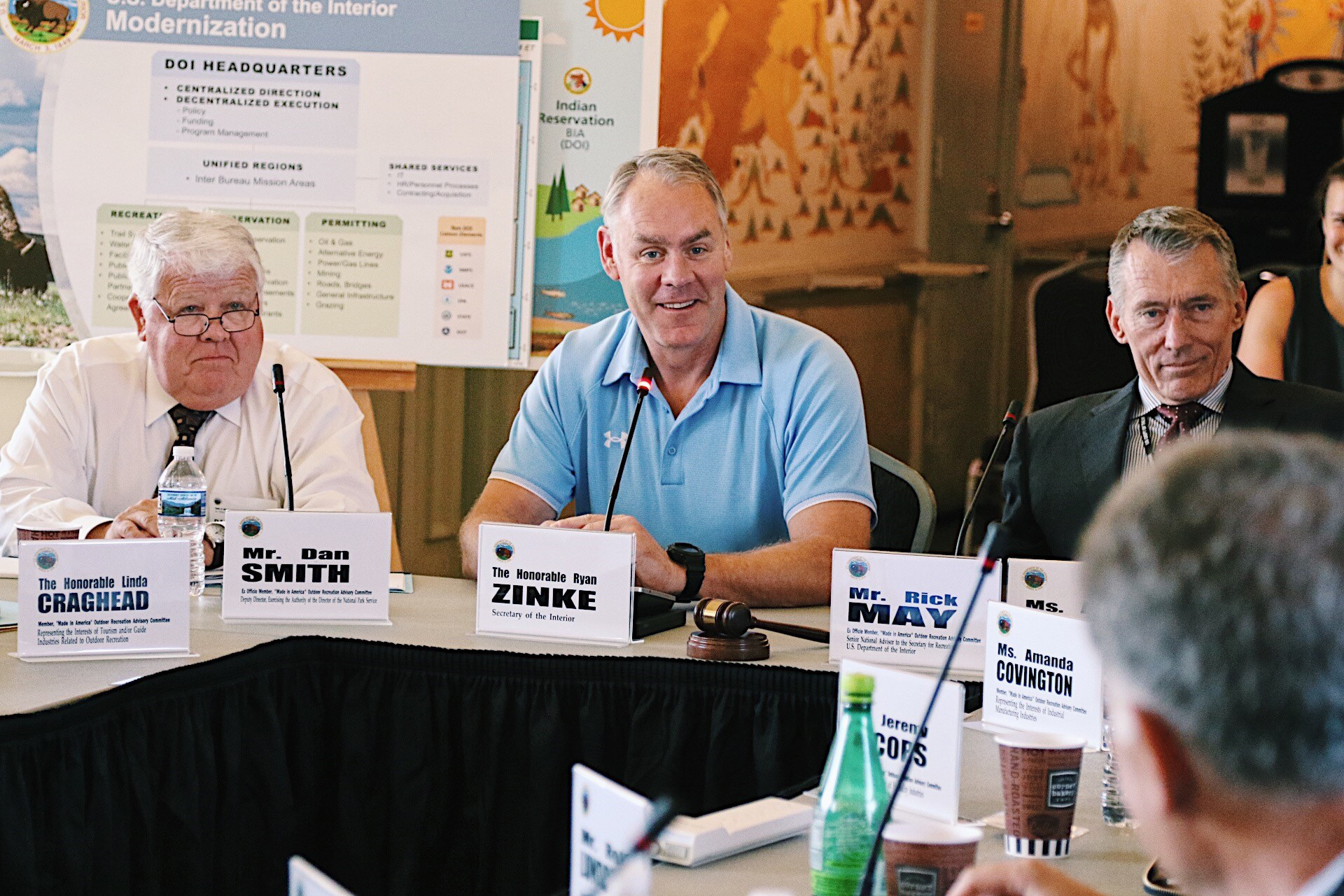Zinke’s Outdoor Recreation Committee Touts Public-Private Partnerships
New ‘industry-dominated’ advisory committee seeks to expand recreation, meets pushback in lawsuit
By Tristan Scott
Since Interior Secretary Ryan Zinke appeared at the department’s inaugural “Made in America” Outdoor Recreation Advisory Committee last month, two prevailing takeaways have emerged.
The first is that Zinke’s goal of building more public-private partnerships within the National Park Service (NPS) will get more people outdoors, and that by expanding park amenities — Wi-Fi access, transportation, campgrounds, boat ramps, concessions — a needed public service will be fulfilled.
“The Outdoor Recreation Advisory Committee will play a significant role in helping drive commonsense solutions that grow the outdoor recreation economy by expanding access to more Americans,” Thom Dammrich, chairman of the committee and president of the National Marine Manufacturers Association, said.
The second takeaway, however, is that the formation of the committee may be in violation of federal law because it’s “stacked” with industry interests from the ATV, tourism, hospitality, outdoor, fishing, recreational boating, manufacturing, and transportation sectors, according to a government watchdog’s lawsuit.
The committee’s mission is compromised because its membership, rather than the NPS, stands to gain from such partnerships, the lawsuit, filed one day prior to the committee’s debut meeting, alleges.
“The membership of the Committee appears to be largely comprised of industry representatives who stand to gain if NPS chooses to privatize services offered to the public in the National Parks,” the lawsuit, filed by the Democracy Forward Foundation in U.S. District Court in the District of Columbia states. “Privatization plans that seek to provide corporations with a profit opportunity, rather than protecting the quality and affordability of National Park services to visitors, will harm the public and make visits to the National Parks less accessible to every American.”
That’s not how committee member Derrick Crandall sees it.
As counselor for the National Parks Hospitality Association and president of the American Recreation Coalition, Crandall believes private companies assuming more responsibility could help address maintenance deficiencies in national park campgrounds.
“Just as we want world-class lodges, we want world-class campgrounds,” he said. “In reality what we have is some of the world’s best campsites in terms of where they are geographically and some of the world’s worst campsites in terms of how they are operated. This could be such an opportunity.”
It’s a belief shared by Zinke, who has invited private entities to play a larger role in managing park service campsites, a move he says could help relieve a sizable burden from the federal agency.
Private companies already run lodging and concessions throughout the national park system, including in Glacier National Park, where Xanterra Parks and Resorts — the largest government contractor for hotel and concession services in national parks — operates lodging, retail, transportation, and food and drink within the park.
Opponents of the idea worry that the shift is in keeping with the Trump administration’s push to turn public resources over to private special interests and increase the privatization of public services, driving up costs and reducing access.
Among the solutions addressed at the committee’s inaugural meeting were the need for strategic public-private partnerships, which will help expand outdoor recreation access by improving everything from transportation to Wi-Fi access, campgrounds, lodging, boat ramps, restrooms, and better use of technology. These upgrades will significantly improve experiences for millions of visitors to America’s public lands and waterways in an efficient and cost-effective matter, according to Crandall
“The first meeting of the ‘Made in America’ Outdoor Recreation Advisory Committee marks a key moment for outdoor recreation in the United States,” he said. “With the diversity and experience of the committee’s members, the Department of the Interior will gain important new insights on ways to enhance access to America’s great outdoors and attract the investments needed to modernize infrastructure and overcome the maintenance backlog of our public lands and waterways.”
The committee, formally established by Zinke in March, was charged with providing the Interior with solutions that will give Americans more access to public lands and waters and improve visitor experience.
The first meeting of the advisory committee comes just months after the federal government formally recognized the economic impact of the outdoor recreation industry.
In early 2018, the Department of Commerce’s Bureau of Economic Analysis included the outdoor recreation industry in its U.S. GDP calculations for the first time. The findings showed the outdoor recreation industry makes up 2 percent of U.S. GDP, surpassing other sectors such as agriculture, petroleum and coal, and computer and electronic products.
Zinke thinks that access could be approved with modernization, while critics worry the public stands to be priced out.
“For example, Wi-Fi access, internal transportation, campgrounds, boat ramps, concessions, and even restrooms are not available on many public lands,” Zinke wrote in an op-ed for Fox News. “Also, once somebody gets to a recreation area, common services like boat, ATV, and fishing pole rentals are often unavailable. Our goal is to expand services so public access to our public land is expanded for all Americans.”